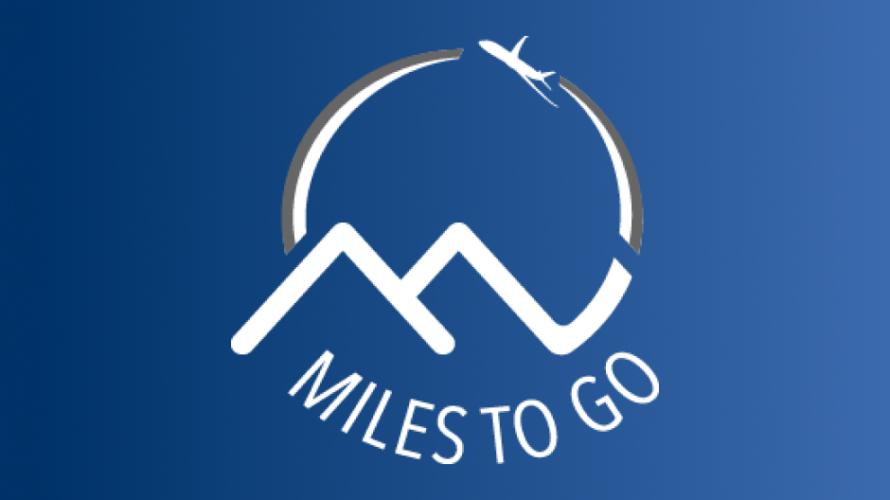Announcer: You're listening to the Miles to Go Podcast, the go-to source for travel tips, news, and reviews you can't afford to miss. Now, here's your host, travel expert Ed Pizza.
Ed Pizza: Hey, guys. Welcome back to the Miles to Go Podcast. Credit cards are a really big part of earning points and miles for so many of the folks listening to the show, and it did start out that way for me. I remember getting my first card that earned points and miles and then getting my second, which I thought was a huge deal. Lots of folks only have one or two. I happen to have a lot more than that, and there's a strategy behind that. We've broken down my wallet in the past, and we've talked about a variety of different cards out there that might be the right fit for you. I thought it would be helpful to branch out a bit, so I'm going to be interviewing some of my fellow podcasters, since their wallets, I think, are different than mine. We're joined today by Gary Leff of View From the Wing back on the show. Hey, Gary, thanks for coming on.
Gary Leff: Hey, Ed. Glad to be here. Glad to be back. Always love talking about this stuff, whether it's the wallet or the flying, the miles. You're probably just going to need to shut me off to move on at the end of the episode.
Ed Pizza: Well, you and I both entered this space back when more miles were earned from flying than from credit cards.
Gary Leff: And that's only barely true because more miles, they're earned from credit cards than flying for a very long time, even though it wasn't quite as disproportionate as it is now, even back when it wasn't quite as lucrative for the airlines as it is now. If you look back, even, gosh, United Airlines declared bankruptcy over 20 years ago, almost 20 years ago. The first call that was being made by the airline after each hearing with the judge was to Jamie Dimon because, even then, it was a credit card marketing program that flew planes, and that has only become much more the case. The programs have gotten bigger, the amounts of money involved have become much larger, and there's a much greater recognition of the economic value of these programs.
Certainly, during the pandemic, that's become doubly so because even though spending on travel cards is a little bit off and card acquisitions are somewhat down and the portfolios are then even a little bit down because they just haven't been acquiring as many new customers, even with the normal attrition, the programs have gone out and raised huge sums of money. American Airlines mortgaged the Aadvantage Program for 10 billion dollars, the future revenue into that program, which is largely a function of money from their program card issuers. Delta almost as much, United six and a half billion. So big, big deal within loyalty are the cards, but it's not just value to the program. It's valuable because there's also value to members if you're careful and pay attention.
Ed Pizza: Yeah. And when you talk about being careful and paying attention, I think that's how I earned my second credit card, because I wasn't paying attention. I had an American Airlines credit card back sometime in the '90s. I don't really remember when. Oh, I had an American Express membership rewards card. I got rid of that and transitioned to a Citi American Airlines card. Then the Starwood AmEx became popular. Well, I wouldn't say became popular. I learned about it, and that was how I learned about FlyerTalk, which would've been before 9/11, so, I don't know, '99, 2000, somewhere in there. I think I learned about it through FlyerTalk, and that was the first time I ever had two mile/point-earning credit cards in my wallet, was I had a Citi AA card and I had the Starwood American Express card, first time I ever had had two cards, and I've certainly never had less than that since then. I can only imagine how many cards you carry.
Gary Leff: My member since date from American Express is 2000, which dates to that Starwood card, because, for a long time, it really was the gold standard. You were earning a star point per dollar instead of a mile per dollar, and, gosh, a star point, when you transferred 20,000 into miles, you got the 5000 mile bonus. It was like you were earning 1.25 miles per dollar, right, 25% better than what you were getting anywhere else, and you had flexibility, and, of course, you could use it for free nights. The power of that card and that portfolio for Starwood and American Express punched way above its weight because of ... It was the value proposition for a long time back then.
But, yeah, I don't keep a regular count of the number of cards. There are a lot. Every card has a specific mission, and I'm careful that every card is worth getting initially because there's a limit, in many cases, on how many you can get over a period of time, which is to say personal cards or cards that will report to your personal credit will usually count against Chase's 524 rules, the idea that Chase will generally only approve people for cards when they have had fewer than five new cards in the last 24 months. So I love cards that don't count towards that number, which is many business cards from a lot of the big issuers don't report in your personal credit.
Actually, one thing that I learned fairly recently is that a brand new issuer can't report its first 500 approvals, and those never get reported. So I didn't actually even know that, but there are people who get grandfathered into never having their cards reported to a reporting agency. But there's some limit. Every one has a purpose, and I'm very careful about which ones I bring into the wallet, and then the ones that I keep have to be worth the ongoing carrying cost. So I guess it's a good place to start thinking, what is the framework for the kind of value that a card is going to provide? I think there's three things that you get out of a card, and it's very important to distinguish them.
So there's the initial bonus, so the upfront offer to get the card, and it is, from the issuer's standpoint, a way to really get your attention, get you to sign up, take immediate action, but that's not the only thing that it does. It puts points in your account right away that gets you close enough to have a reward pretty quickly, and that's also really important because when you redeem your points, you demonstrate to yourself that it was a good decision to get the card, and you tend to double down on using it. So they want you to be able to redeem. That upfront bonus that's really valuable is a good reason to get a card, but that alone is not a good reason to continue spending on the card after you've earned that bonus or keep the card.
What you want to look at is either, a., what is the return on your spend on an ongoing basis, is this the most value that you can get out of a particular kind of spend, or, b., what are the benefits from holding the card? That's your lounge access. That's your global entry or pre-check benefit, your companion ticket, status in a program. So what are the benefits? Now, the benefits are a reason to have a card, to keep a card. You get your free checked bags or your priority boarding site. But that's not necessarily a reason to spend on the card outside of any spend that's directly related to earning the benefit.
So while you may want to get a card with that upfront bonus, you may want to keep a card because of the benefits, but, for ongoing spend, you want to focus on what is the return on that spend? That's the framework that I use when I'm thinking about whether a card is good, and when people ask me what card you should get, it really depends on what you value in terms of the benefits that you're going to use and in terms of what do you spend money on and how do you want to use your miles, how do you want to use those points. That matters a lot because different programs, you're going to be better for the reward that you're looking for.
Ed Pizza: Yeah, for sure. And to be clear, just like we've said on the show many times, that calculus is going to be different for everyone based on exactly what they want to do with their points, how they spend. So let's talk a little bit about what earns a place in your wallet, and I'll let you pick where you want to start from a card standpoint, but let's pick something that's in your wallet now and talk about why it's been there.
Gary Leff: Okay. The one card that's in my wallet right now is the American Express Platinum Card. This is not an inexpensive card. It currently has a $550 annual fee. So it's really got to deliver for me to be worth keeping. In terms of actual spend on that card, I pretty much limit it to airline tickets that earn me five membership reward points per dollar. Now, I wouldn't get the card just for those five membership reward points earning, but since I value the benefits and it covers the cost for me of having the card, I really like the high level of earning on those on tickets. And, of course, I wind up buying tickets not just for myself but for others as well, booking for others, get reimbursed, inaudible are great. I earn lots of points that way.
But the question of what are the benefits that get me to that $550, first of all, there's a couple hundred dollars of Uber credit that I'm getting every year, spread out over the course of 12 months. Because I use Uber and because I'll user Uber Eats, it works out for me being basically like cash. A lot of benefits may have a value, but you really need to discount it to what would you spend otherwise. Is it actually displacing money that's leaving your wallet? Otherwise, it's not worth face value. For me, it's basically worth face value. I've also been able to largely get face value out of the airline fee credit, so that's $200 in value that I've been able to get there. That's $400 of the $550. Right now, one of the reasons it's been nice to keep is they're offering a PayPal credit each month for several month, $30, and that helps cover some of the costs as well. I already got my airline fee credits value this year, but for those that aren't, it's a nice offset. So I'm more than covering that value.
It also comes with a variety of benefits like airline lounge access, which, in normal times, I value a lot. So I have access to a lot of the different lounges. With the Platinum Card, I get the Delta lounges when I'm flying Delta, and I live in Austin. They have a gorgeous lounge in Austin, indoor, outdoor, overlooking airport operations. You sit outside. It's great. It gets me Centurion lounges, which are generally nicer than airline lounges, albeit crowded because the challenge with any lounge is always no matter how they plan, no matter how many people they think are going to visit and how they model the space, there will always be greater demand than you think for a nice airport lounge. People will come earlier. They will stay longer than intended. They will eat more. Even when you account for those things, it always surprises you. So the lounges get crowded.
It also lets you get into the Airspace lounges and Plaza Premium lounges, which is nice. You can request a priority pass. I wind up using a priority pass with Chase because American Express doesn't let you use the airport restaurants with its credit the way that other priority pass cards still do. But I certainly get more than ... Oh, and I get my Hilton gold status from them as well and my Enterprise car rental status from them. These aren't hugely valuable, but they're nice extra perks once I've already covered the annual fee on the card for myself. But, again, it's a card I keep but not one that I'm doing a ton of spend on.
Ed Pizza: Sure. Yeah, well, because outside of airline tickets, and then I always get the regular Platinum and the business Platinum confused, but I think it's hotels, if you buy it through their portal, you get 5X on the personal. Is that right?
Gary Leff: I completely discount the buy through their portal inaudible thing because-
Ed Pizza: Yeah, that's not me either. That's the problem I have. I carry the business Platinum Card, and I won't book through their portal, so it's a miss for me.
Gary Leff: Here's a point that I've made to very, very senior American Express executives. I'm like, "Look, you give status in the Marriott program and the Hilton program with the Platinum Card, but if your members book through your portal, they do not get that status recognized at the hotel, they don't earn credit in the loyalty programs of the hotel brands with which you partner. You really need to be able to solve that." That should be something they can solve. But if you're giving up the hotel points, you're giving up the status recognition, you're giving up the credit towards status, it's usually not going to make sense for me to book through them to earn more points when I can earn almost as many points paying with a different card and booking directly. So that's usually how I'm going to do it.
Look, it makes sense when you book through their portal they are earning revenue on the booking, and so they're rebating more of that revenue to you in terms of points, but it's the friction in terms of what you have to give you up and the experience when you do it that way that just doesn't make it worth it to me and seems like something they ought to be able to solve.
Ed Pizza: Yeah. I hope so because it's ... One of the biggest drawbacks of the business Platinum Card that I carry is that to get 5X on that card, I have to buy my airline tickets through their portal, which I just won't do, and then I don't use the hotel benefit, so I disregard two of the very big benefits of that card. All right. So let's talk about what else is in your wallet, and I know your wallet goes beyond just what you carry with you, but let's try to focus on cards that are more a part of your everyday usage. What's next up in the wallet?
Gary Leff: In the wallet right now is my premium Marriott card, which was originally my Starwood AmEx that I got two decades ago. Now, that has a $450 annual fee. It gives you $300 of credit for Marriott spend, which I'm going to stay and spend $300 with Marriott in a year, so it really does work its cash for me. Now, I'm down to a net of $150. It gives me a free night every year at a hotel that's up to 50,000 points. For me, that is worth at least twice that $150, and so it makes sense to keep. Now, right-
Ed Pizza: Yeah. And let's stop there one second. I want to make one point for folks that are listening that I know you've said, but I want to make sure we really enunciate this, especially with a lot of the cards that are out there now that have larger annual fees. With some cards, and it's not many, but this card ... I assume this is, what, the Bonvoy Boundless AmEx?
Gary Leff: No, this is Brilliance.
Ed Pizza: Brilliant, okay. Too many Bs. So you're essentially-
Gary Leff: Boundless, Brilliant, and Bold are inaudible cards.
Ed Pizza: Very alliterative. So, yes, $450 annual fee will scare a lot of folks when they see that number, but as Gary said, this card comes with as no string attached as you can $300 credit that you can use at any Marriott hotel. Well, probably not any, I'm sure there's a couple, it's a Marriott, so there has to be some exclusions, but the vast majority of them. So, as Gary says, as long as you're going to stay, have a paid Marriott stay sometime during the course of a year, your annual fee is really $150 on that card, not $450, because you're going to get a dollar for dollar credit on a $300 hotel room somewhere along the way.
Gary Leff: And it doesn't even need to be a paid stay, right? So if you're redeeming points, this helps you cover the resort fee that Marriott tacks on on a lot of these stays-
Ed Pizza: Right, good point.
Gary Leff: ... or your room service during the rewards stay or the spa charges that hit your folio. Anything that's on the folio, it'll be a credit against. So then, for me, it's a net $150, and then is a free night that's worth 50,000 points worth $150? Absolutely, and I will use it. Right now, I'm also getting a credit every month on restaurant charges. Look, if I'm able to pick up a 20 bucks a month rebate on using the card at a restaurant, the reason it's in my wallet is so that I use it once a month.
Ed Pizza: Right. Right.
Gary Leff: Right? That's why it's in the wallet versus just something that I have.
Ed Pizza: So do you still have multiple Marriott cards?
Gary Leff: I do have a small business AmEx as well, and that comes with a free night up to 35,000 points, which, to me, is worth its annual fee. The reason I like to have a personal and a small business card is because each one of those gives me 15 elite nights for the year, and so together that's 30 elite nights. Now, why do I still need elite nights with Marriott? The truth is I'm probably not going to stay with them enough to earn their 75 night status, titanium, so platinum is good enough. So why am I actually not a lifetime platinum Marriott? That's an interesting question, isn't it?
Ed Pizza: Are you still stuck on their math?
Gary Leff: Yeah. So, interestingly, I lost a bunch of nights and years of status when Starwood and Marriott were combined, and that never fully got fixed. When the programs were combined, it showed up that I had a combined three years of platinum status. That was finally incremented up to 13, which would've been enough, and then it was reduced to 11, and it hasn't gone up in a couple years. But, somehow, I'm showing in the 400s of nights, and I'm like, "Whatever." You know what? They gifted us elite nights last year and this year based on status. It's fine. With these cards, I'll get my status. I have platinum currently, and I will get my lifetime platinum back in a couple of years, and I'm just not going to worry about it anymore. So I'm earning my 30 nights a year just that way, and, actually, right now, last year and this year, I'm going to wind up making my choice benefit five nights as I claw my way back to lifetime platinum.
Ed Pizza: So are you putting any spending on either of the Marriott cards outside of Marriott stays?
Gary Leff: Well, as I say, the only spending I'm doing with the Marriott card right now is about 20 bucks a month in restaurant to get that rebate, and that's the only spending I'm doing.
Ed Pizza: All right. So I'm going to guess, just based on what I know about your travel history, that there's at least one Southwest card in that wallet?
Gary Leff: At the moment, there is not.
Ed Pizza: Oh.
Gary Leff: I earned a Southwest Airlines Companion Pass in early January of 2020. In the fall of 2019, I did get a small business card with a big bonus, and that bonus hit at the beginning of January, and I also put a bunch of spend on that card so that, boom, I had enough points in early January to earn a Companion Pass that was valid for all of 2020 and all of 2021. I even did inquire, and I was told that I was one of the very first people that year to earn a Companion Pass, but, sadly, I was not first. That was a function just of the closing dates on my card because the spend was on the card January 2nd, but I learned that I wasn't first because my close date was too late. Of course, then, all of a sudden ... And I had visions of, "Now, I've got two years of Companion Pass," but then all my-
Ed Pizza: Wah, wah, wah.
Gary Leff: Yeah. 2020, I didn't make a whole lot of use. I have used it in 2021. I'd made bookings in 2020 which I wound up ultimately having to cancel. I've used it in 2021. But I didn't keep the card during the pandemic. They didn't make me any offer to keep it, and I didn't see a point in paying the fee on the card when I wasn't travel, so I did let it go. Now, I would not be surprised if I was interested in another Southwest card at, say, the end of 2021, with a goal of earning a Companion Pass in the beginning of 2022 valid through the end of 2023.
Ed Pizza: Yeah, okay. That's fair. All right. So we've got American Express Business Platinum, we've got a premium and a regular level Marriott card, we don't have a Southwest card. I still haven't heard an airline credit card hanging out in the wallet, and I'm starting to think that maybe there isn't one.
Gary Leff: So-
Ed Pizza: Oh, yeah, no, you probably still have the Barclays card.
Gary Leff: So I actually have two airline credit cards. One of them is the Barclays Aviator Silver, and the other is the Citi Aadvantage Executive. Let me tell you about each there. The Citi Aadvantage Executive is the premium American Airlines card that comes with club membership. In a normal world, I visit the American Airlines Club at Austin very, very often, and the ladies, and I'm not being sexist, they're all ladies, there are incredible. When American Airlines has a flight delay, a cancellation because of mechanical, they save my bacon all the time, and so it is worth it to have access to them to help me. I believe that the people working in that club are the best in the system.
So it's worth it for that, and, by the way, in 2019, I did put $40,000 of spend on the card. It earned me 10,000 qualifying miles in addition to the miles, and as I was branching out to fly more airlines, I still wanted to earn my executive platinum status, and that meant that I didn't need to fly as much on American to do it. So I put $40,000 spend on the card, I got my lounge access, it was worth the fee, and the Barclays Aviator Silver card, also, I put spend on. Actually, I put $50,000 of spend on, which earned me both 10,000 qualifying miles and 3000 qualifying dollars, and it also generated a $99 companion ticket that I was able to use for both my wife and my daughter, who travel with me at $99 a piece, plus tax. That was worthwhile to me, again, because it let me diversify my flying while still keeping my status.
Ed Pizza: Right. All right. So American Express Business Platinum, two Marriott credit-
Gary Leff: I have the Personal Platinum.
Ed Pizza: Sorry, Personal Platinum. I keep getting stuck on that because I applied for the wrong one. American Express Personal Platinum, two Marriott cards, two American Airlines cards. Anything else hanging out in the normal rotation in the wallet?
Gary Leff: So I've got the American Express Gold Card, and it is rose gold. I do actually think it's attractive. It's not why I carry it.
Ed Pizza: I like that card. Yeah. Yeah.
Gary Leff: It is my standard restaurant card at four membership rewards points per dollar.
Ed Pizza: Yeah, and that's what I carry it for as well. I think it's a really solid card. It's hard not to get the value out of that card, especially with so many other perks on it. But even just on restaurants, you can get great value out of it.
Gary Leff: Yeah. They do other categories that I'm generally getting good bonuses on other cards from, but it's one that I have ... Mine's actually an authorized user card on my wife's account, rather than us both having it at the moment.
Ed Pizza: Yeah. I think it's one of those cards that I consistently recommend to people if they're looking to have just one card in their wallet. It's not a best in brand in every single category, but I do think it's a bit of a Swiss army knife when it comes to, look, if you only want to carry one or two cards, it can cover a lot of bases at decent bonus opportunities for earning miles, and you also get the AmEx offers along with it.
Gary Leff: Yeah. I'm looking at other cards that are in my wallet. I have three no annual fee cards actually sitting here. We're talking a lot about-
Ed Pizza: Well, I'm pretty sure you have Citi Double Cash, right?
Gary Leff: I don't.
Ed Pizza: Oh, I thought you had that.
Gary Leff: No. Citi Double Cash is great, no annual fee. It really provides a benchmark. It's okay. Two percent cash back on anything. If you have a Citi Premium Card, you can then transfer points. You're earning two points per dollar and then move it to the other account and then onto airline miles. Citi has some interesting partnerships, especially Turkish or redemption on United and some other good redemptions. But I've actually never gone and gotten it, so it's just where am I with Chase, and is this the top thing I want to get versus other things as I'm limiting some of my applications, and I just haven't done it. But I do have two different Freedom cards.
Ed Pizza: Okay.
Gary Leff: Right? So Freedom Unlimited earns one and a half points per dollar on everything, and those transfer to premium at Chase cards that let you transfer the miles, so it's a no annual fee way of earning one and a half Chase points on everything. Again, that's the least number of points then you should ever earn. I mentioned Citi Double Cash as a benchmark because the idea there is two percent cash back means that whatever points you are accumulating, you're basically buying for two cents, which makes it really clear that you shouldn't ever earn one airline mile per dollar because if you're earning one airline mile per dollar, you are buying that mile for two cents because of the opportunity cost of earning two cents for that dollar of spend. So you always want to earn more than a mile per dollar or it doesn't make sense.
So one and a half is a good starting point. Freedom Unlimited is an easy way to do that paired with another Chase card. I have yet to upgrade my Freedom card to its new replacement from Chase, which I need to do. But I like the quarterly bonuses that combined can earn you an extra 24,000 of points a year or thereabouts compared to what you would otherwise earn from your spend, you said it, because you're earning 5X in these rotating categories versus a point somewhere. So I like to take advantage of those. Maybe it's gas, maybe it's grocery store or Amazon or a wholesale club or what have you, but those rotating categories as a no fee card, I had downgraded the card rather than using a slot to get that a long time ago.
But I also have another no annual fee Chase card, and that's the Ink Business Cash. So that earns five points per dollar on my cable TV, on my Internet, on my phone service, and that's a decent bill every month to earn 5X off of, again, at no annual fee, move the points over to a premium Chase card. Then they're transferrable to miles and worth more. It also is what I would use for office supply stores, right, for-
Ed Pizza: Yep. I use my Ink card for a lot of office supply purchases.
Gary Leff: For 5X. So that's got a place that's currently in the wallet as well and doesn't put me into a drawer to sort through.
Ed Pizza: So it's a pretty good cross-section of cards. To wrap up, and I didn't ask you this question ahead of time, so I'll put you a little bit on the spot, but I feel confident that you won't let me down. If you had to pick one or two, up to you, depending on what's on your mind right now, if you were going to put a card in your wallet, if you're going to apply for something, whether it was because of the sign-up bonus and benefits or something that you thought you were going to spend on, what's something that you've considered adding to your wallet?
Gary Leff: First of all, I should say, I did leave out the Hyatt card. It is in my wallet.
Ed Pizza: Yes, of course. Yeah.
Gary Leff: I don't want to give short shrift to that card, right? I also would say, the next card that I get, I'm very tempted by Capital One Venture. Big spend to earn it, but there's a 100,000-mile offer, and they've improved their mileage transfer program. In general, I really prefer points that transfer to a variety of different airline programs, and that's your Chase, American Express, Citi, and Capital One. It gives you the flexibility to decide where to put your miles later rather than being locked in up-front, so I find the flexibility to be really valuable. Since I've gotten nice seven-figure balances with Chase and American Express, more diversification would be good, as well as, as I say, they've improved the transfer ratios to some of their airline partners. As a general matter, there's not a lot of good hotel transfer opportunities. Chase to Hyatt is a good one, but otherwise you tend to lose too much value in making that conversion. So that's one that is on my radar as one I would choose.
For a while, I said I need to get the American Express Blue Business Preferred. I can do better than I'm doing right now with un-bonus spend, where when I've got no other bonuses, I've got that Freedom Unlimited at one and a half X at minimum. I'd love to amp that up to 2X minimum, and I haven't done that. I've recognized I need to do it. I've said I need to do it. It is even more desirable, in a way, than a personal card that would report on my personal credit and take up a 524 slot. That one doesn't. So it seems like a no-brainer, and I just need to ... It's how do you move things from the list of this would be good for you, good to you, to the list of here's the top five things I actually do this week, and it's kind of ... I'm not a perfect optimizer to the extent that I could be better than I am and I know it, and so I'm leaving value on the table. I just haven't moved it to the list of, "Okay, I really need to take care of this."
Ed Pizza: Well, yeah, and when you talk about it, so I applied for the Capital One Spark Miles for Business card. I'm almost positive that's the one that I have. I applied for it when the sign-up bonus was real big a few years ago. I earned a bunch of points on it, and the transfer partners had come out at that point, but there wasn't anything was truly compelling. You talk about hotel transfer partners. It was Wyndham and Choice, which aren't primary choices for me. The airline choices, there were some fine choices there, but they weren't top of my ... It wasn't American, Delta, United. Certainly, I had availability to move currencies and book stuff if I wanted to, but I ended up spending on the card and then ultimately setting it aside and not using the points. With their recent changes to the transfer partners, they're certainly more appealing with some of the transfer ratios now that I might consider spending on the card.
I think the one thing that I also have my eye on, we just finished refinancing our mortgage, and we do primary banking with Bank of America, and so they've got a cash rewards card where because ... They have an interesting category. You earn three percent cash back in the category of your choice, based on what you're spending on a monthly basis, and then that number can get plussed up if you have things like mortgages and savings and stock portfolios and stuff with the bank. So that's an appealing one that it's on my list of stuff I need to do and just haven't done.
Gary Leff: And 2.65% cash back on towards travel on all your spend at the minimum, too.
Ed Pizza: Yeah, no, I think it's a good ... For me, I think I'm leaving some money on the table because I carry the Citi Double Cash card. I think I'm leaving a decent chunk of money on the table. I don't put a ton of spend on the Double Cash, but it's my default card when I'm un-bonus spending. There aren't a whole lot of currencies that I'm collecting right now that I think are worth more than that on un-bonus spend for personal stuff based on what I have in my wallet. So I do think that's probably the card that's on my radar coming up.
Gary Leff: Yeah. That makes a lot of sense.
Ed Pizza: Well, cool. I know there's more behind that, but I think that's a good cross-section of what you're carrying and what you're spending on. So I'd say, top of my head, you've got a couple of cards that you're putting major spending on, and that's about it. You're putting a bunch of spending on those American Airlines cards to earn that shortcut to elite status, if you will, and then the other cards are mostly situational spending for you, right?
Gary Leff: Yeah. I'm looking for one card gets my airfare, one card gets my restaurant, and different cards getting my hotel. In non-pandemic times, those are the things that I spend the most on because I'm a regular traveler. Even when I'm not traveling, I eat out. So those are the things that are in my wallet. My wife's wallet would be a little bit different in terms of what she's actually carrying to optimize the idea, how am I getting the most valuable points for our needs based on what we're actually spending on when spending isn't being used to earn a big bonus or an elite credit or something like that? So that's basically the strategy, and we'll cycle some cards in and out of the wallet as they make sense. It's a little bit different during the pandemic. Beginning to travel again, and that changes what I'm carrying. As I say, I have plans. I'll probably be really interested in having a Southwest card again, when I wasn't interested in paying the fee when I wasn't traveling at all. So that changes over time.
Ed Pizza: Yeah. And for folks who are listening, you've certainly heard me say this a lot. I think if you only take one thing away from this segment, I think hearing Gary say that he's a Southwest elite status advocate for him, it works out well for him and his family, but the card wasn't earning its keep in his wallet during the pandemic. I'm not saying that you shouldn't hold onto a card for forever and you shouldn't just call and get rid of it. It's more that I want you guys doing check-ups on your wallet on a periodic basis, and that card should earn a place in it. Everybody has their own value on what that really means.
I don't tend to sign up for a card just for the sign-up bonus. I want other things out of it. I do want to spend on the cards periodically over time to be a good customer, but we've all got a different feeling for what that is. The important thing is just to make sure that you don't overlook the fact that there's a card in your wallet that isn't earning its keep. In this case, Gary set that card aside because it wasn't, and I assume Chase wasn't willing to give you the right sort of retention offer to keep it until you were going to be spending on it.
Gary Leff: Yeah. They didn't offer me anything, really.
Ed Pizza: Right. So it saves you the decision. Yeah, I can pay an annual fee to have this card gather dust in my wallet. Those are the important things for you guys to focus on. I think, as you go through what Gary had in his wallet, you guys have certainly heard what I have in my wallet, I'd say if you have questions about your wallet, we love breaking this stuff down, so you can always shoot me an email here at the show and at pizzainmotion.com, and we can break your wallet down for you or we can make suggestions. You can find the show on social media, Twitter, Facebook, and Instagram, all @pizzainmotion. Love to break down your wallet and make sure that you've got the right cards to earn the right amount of points and the right currency so you can take that dream trip when we're all traveling normally again, which, Gary, is getting closer and closer every day.
Gary Leff: I'm certainly very hopeful. I have a bunch of domestic trips, but I've got international trips planned for later this year, and the nice thing is I'm using miles, I'm using points for the hotels and everything's cancelable at no cost, so I'm really just creating the option of something to look forward to. I've got international plans that I'm really hopeful about.
One thing that I thought was actually very nice ... American Airlines rewards were already cancelable for me for free with my executive platinum status. However, one change that they made during the pandemic was to eliminate cancellation redeposit fees on all of their reward redemptions, and that's not just domestic, that's not just on their own metal. It includes upgrades. It also includes partner rewards for every member. So that's actually been really nice for a lot of folks. Your miles create optionality, and it's not a cost or a decision, do you want to keep them if a trip doesn't pan out? So if you see award seats in a situation like that where it's a no-cost option, grab the option and do have something to look forward to. If you see an award that you like better, it doesn't cost you anything to make that change.
Ed Pizza: Yeah. I think that's one of the biggest pluses to come out of the pandemic, is just that increased flexibility that a lot of airlines are providing on a number of different types of tickets. It makes it easier for us to dream and to plan. Gary, thanks for taking a chunk out of your day to catch up with us and break down your wallet. When you're not hopping on the podcast with me, tell folks where they can find your writing on a daily basis.
Gary Leff: Well, you can find me at viewfromthewing.com, and you can find me through most social channels, @garyleff.
Ed Pizza: Awesome. Hey, thanks, man. Hopefully, we'll have you back on again soon, and might even be a Southwest card tucked in that wallet by the next time we talk to you.
Gary Leff: Yeah, well, hopefully, I haven't worn out my welcome, and, hopefully, it happens before I need that Southwest card again.
Ed Pizza: Well, you haven't worn out your welcome yet. We'll just have to see what happens in the future. Take care, man. Talk to you soon.
Gary Leff: All right.
Ed Pizza: That's a full wrap on this week's episode. You can find links to everything we discussed today in the show notes. A big thanks to all of you for tuning into this week's show. If any of you have questions or suggestions for a future show, you can drop me an email at ed@pizzainmotion.com or hit me up on social media, Twitter, Facebook, and Instagram, all @pizzainmotion. And you can find me blogging daily at pizzainmotion.com. Until we upload again, we've got miles to go.
Sign up to receive email updates
Enter your name and email address below and I'll send you periodic updates about the podcast.
Links:
If you enjoy the podcast, I hope you’ll take a moment to leave us a rating. That helps us grow our audience!
Hope you enjoy the show!
If you have a suggestion for a future show find me on Twitter, Facebook or Instagram and let me know what you’d like to hear about!












got to the American Airlines arrivals lounge at Heathrow and realized I left my suit bag in the closet of the plane. Panicking (because I would have to go to my meeting in jeans) I asked the agent (Marc) if he could call the gate. The gate didn’t answer so he went himself all the way back to the plane and retrieved my bag from the closet, through security in two directions. As Heathrow T3 is basically a huge maze, the round trip was probably more than 30 minutes. That guy totally saved my life.